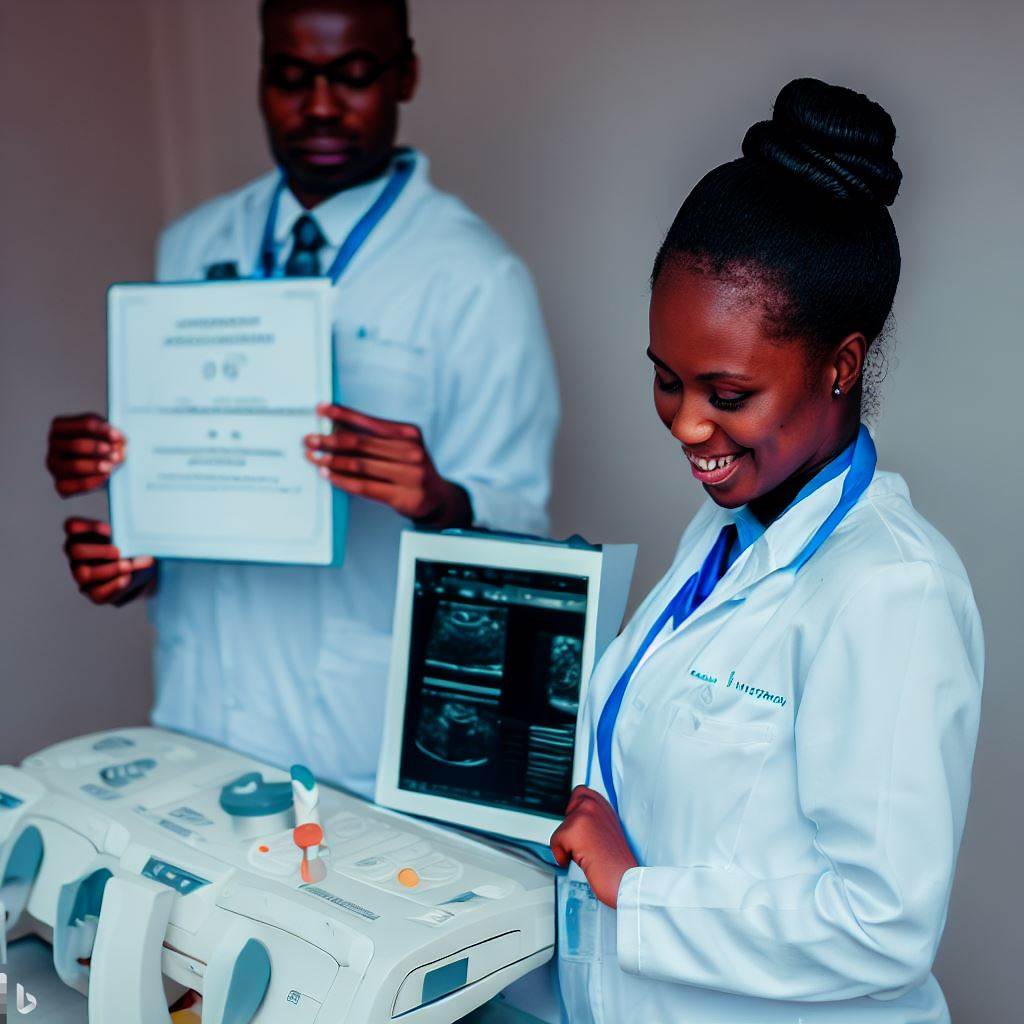Introduction
In Nigeria, the lab tech profession plays a crucial role in healthcare and scientific research. Discussing women’s experiences in this field is important to address gender disparities and promote inclusivity.
Women in Nigeria face unique challenges and opportunities in the lab tech profession. By highlighting their experiences, we can shed light on the need for equal opportunities and support for women in this field.
This blog section aims to provide an insight into the experiences of women working in the lab tech profession in Nigeria.
It will explore the achievements, struggles, and contributions of women in this field.
Through personal stories and research findings, we will uncover the barriers that hinder women’s progress and discuss potential solutions for a more inclusive lab tech profession in Nigeria.
Additionally, this blog post will emphasize the importance of leadership roles for women in the lab tech field and the significance of mentorship and networking.
By promoting gender equality in this profession, we can harness the full potential of talented women and drive innovation and advancement in Nigeria’s healthcare and scientific sectors.
Join us as we delve into the experiences and challenges faced by women in the lab tech profession in Nigeria, and explore strategies for a more inclusive and empowering future.
Women in Lab Tech Profession in Nigeria
Statistics on the representation of women
According to recent data, women make up only 35% of the lab tech profession in Nigeria. There is a significant gender gap in this field, with men dominating the workforce.
This underrepresentation of women indicates the need for more efforts to promote gender equality.
Challenges faced by women in the profession
Gender bias and stereotypes contribute to the challenges faced by women in the lab tech profession.
Women often encounter prejudices and assumptions that they are not as competent as their male counterparts.
This bias leads to discrimination in terms of promotions and opportunities for career advancement. Lack of opportunities for career advancement is another major challenge for women in this profession.
Women often find it difficult to break through the glass ceiling and reach higher positions. Balancing work and family responsibilities is a significant challenge for women in the lab tech profession.
Many women struggle to maintain a work-life balance due to societal expectations and family obligations. This imbalance often leads to women being overlooked for opportunities and career growth.
Transform Your Career in Nigeria
Discover unmatched expertise with our personalized Career Consulting service. Navigate Nigeria’s job market with a strategy tailored just for you.
Get StartedIn the end, the representation of women in the lab tech profession in Nigeria is still low, with only 35% of the workforce being female.
Women face numerous challenges, including gender bias, limited opportunities for advancement, and difficulties in balancing work and family responsibilities.
To promote gender equality in this field, it is crucial to address these challenges and create a more inclusive environment that supports the professional growth of women.
Read: Lab Technician Salary and Benefits in Nigeria: A Guide
Factors Influencing Women’s Participation
Societal Norms and Cultural Factors
Traditional gender roles in Nigerian society discourage women from pursuing careers in lab tech.
Cultural beliefs about women’s abilities and roles limit their opportunities in the lab tech field.
Family expectations often prioritize marriage and child-rearing over women’s professional ambitions.
Perceived lack of acceptance and support from male colleagues and superiors hinders women’s advancement.
Gender stereotypes and biases lead to an undervaluation of women’s skills and contributions in the lab tech profession.
Educational Barriers and Gender Disparities
- Girls in Nigeria face limited access to quality education, especially in science and technology subjects.
- Gender-based discrimination in educational institutions discourages girls from pursuing a career in lab tech.
- Lack of female role models in science and technology fields contributes to low interest among young girls.
- Inadequate resources and facilities in schools hinder girls’ learning and practical experience in lab tech.
- Gender disparities in enrollment rates and academic achievement create barriers for women in pursuing lab tech careers.
Lack of Adequate Mentorship and Support Systems
Women in the lab tech profession often lack access to female mentors who can guide and inspire them.
Absence of strong professional networks and support groups diminishes women’s sense of belonging and career development.
Limited opportunities for career advancement and leadership positions discourage women from staying in the lab tech profession.
Lack of workplace policies and initiatives tailored to women’s needs and challenges hinders their professional growth.
Minimal support from employers in terms of flexible work arrangements and childcare options affects women’s ability to balance work and family responsibilities.
In essence, various factors contribute to the underrepresentation of women in the lab tech profession in Nigeria.
Societal norms and cultural factors, educational barriers, and lack of adequate mentorship and support systems all play significant roles.
Addressing these issues requires a multi-faceted approach, including promoting gender equality in education, challenging gender stereotypes, providing mentorship programs, and implementing supportive workplace policies.
By creating a more inclusive and supportive environment, Nigeria can harness the full potential of its female population in the lab tech profession.
Read: Understanding the Lab Technician Certification in Nigeria

Initiatives Empowering Women in Nigeria’s Lab Tech Profession
Women in Nigeria’s lab tech profession are breaking barriers, and various initiatives play a crucial role in supporting and empowering them.
Professional Associations and Networks
- Women-focused lab tech associations offer mentorship and skill-building opportunities to aspiring professionals.
- Networking events provide a platform for women to connect, share experiences, and exchange knowledge.
- Training workshops and seminars equip women with the latest advancements in lab technology.
- Recognition awards celebrate outstanding achievements, encouraging women to excel in their careers.
Government Policies and Programs
- Gender-inclusive policies promote equal opportunities for women in the lab tech field.
- Government-sponsored scholarships and grants enable women to pursue higher education in science and technology.
- Reserved positions in public labs create a balanced workforce, fostering gender diversity.
Corporate Diversity and Inclusion Initiatives
- Leading companies in the industry prioritize gender diversity and inclusivity in their workforce.
- Internship programs offer valuable hands-on experience, bridging the gender gap in lab tech.
- Mentorship schemes pair women with experienced professionals, nurturing their growth and success.
- Flexible work arrangements accommodate work-life balance, empowering women to thrive in their careers.
These initiatives not only support women in the lab tech profession but also contribute to the advancement of science and technology in Nigeria.
Embracing diversity and promoting gender equality will undoubtedly pave the way for a more innovative and inclusive future.
Let’s continue to build a world where every woman’s talent and potential are valued, and their contributions are celebrated and acknowledged.
Together, we can create a brighter and more equal future for all lab tech professionals in Nigeria.
Publish Your Professional Profile, Business or Brand
Showcase your expertise, gain trust, and boost visibility instantly on Professions.ng.
Publish NowRead: Top Institutions to Study Phlebotomy in Nigeria
Success Stories and Role Models
Profiles of Influential Women in the Field
- Dr. Funke Adeyemi – Pioneering Virologist who developed a breakthrough diagnostic test.
- Prof. Adaobi Okonkwo – Leading Geneticist transforming healthcare through precision medicine.
- Engr. Amina Bello – Renowned Biomedical Engineer creating innovative lab equipment.
- Dr. Ngozi Eze – Esteemed Chemist unraveling environmental solutions for Nigeria’s challenges.
Inspirational Stories of Women Overcoming Challenges
- Sade Akindele – A lab technician who fought societal norms to pursue her passion.
- Bisi Ojo – Overcame financial hurdles to establish her own successful lab.
- Aisha Mohammed – Defied gender bias and shattered glass ceilings to become a lab manager.
- Zainab Ibrahim – Triumphed over adversity and now conducts life-saving research in virology.
Importance of Visibility and Representation
- Empowerment Through Representation – Young girls inspired to join the lab tech profession.
- Breaking Stereotypes – Women showcasing their skills drive change in societal perceptions.
- Mentorship and Guidance – Role models provide support for aspiring women in the field.
- Driving Innovation – Diverse perspectives fuel creativity and advance scientific discoveries.
Visibility and representation of women in the lab tech profession not only uplift individuals but also foster a more inclusive and progressive society.
As these successful women’s stories continue to inspire generations, the future of Nigeria’s scientific landscape shines brighter.
Together, we celebrate the achievements of these remarkable women and look forward to a future where gender equality thrives in laboratories across the nation.
Read: Occupational Therapy Schools: Where to Study in Nigeria
Strategies to Encourage More Female Participation
- Addressing gender biases and stereotypes: By actively challenging and debunking gender biases and stereotypes within the lab tech profession, we can create a more inclusive environment for women.
- Providing mentorship and leadership development programs: Implementing mentorship programs that pair female lab tech professionals with experienced mentors can provide guidance and support in their career journeys.
- Creating safe and inclusive work environments: Investing in policies and practices that promote inclusivity, such as zero-tolerance for harassment, can make women feel safe and valued in the lab tech profession.
Addressing gender biases and stereotypes
Gender biases and stereotypes have long hindered women’s participation in the lab tech profession in Nigeria.
However, by actively addressing and challenging these biases, we can foster a more equal and inclusive field for both genders. One strategy to tackle these biases is through education and awareness.
By educating colleagues, supervisors, and the wider industry about the harmful effects of gender-based assumptions, we can dismantle existing stereotypes and create an environment that values individual merit over gender.
Additionally, it is crucial to encourage girls from a young age to pursue careers in science and technology.
This can be achieved through outreach programs, scholarships, and showcases of successful women in the lab tech profession.
By showcasing real-life role models, we can inspire young girls and break down their internalized biases about STEM fields.
Providing mentorship and leadership development programs
Mentorship and leadership development programs play a vital role in supporting women in the lab tech profession.
These programs can provide guidance, advice, and valuable insights from experienced professionals who have faced similar challenges.
Pairing young female lab tech professionals with mentors who can offer guidance on career development, workplace challenges, and skill-building opportunities is essential.
Mentorship helps women navigate barriers and develop key competencies necessary for career advancement.
Furthermore, leadership development programs can equip women with the skills and confidence needed to take on leadership roles within the lab tech profession.
By providing targeted training and opportunities to develop their leadership abilities, we can create a pipeline of women leaders.
Creating safe and inclusive work environments
Creating safe and inclusive work environments is crucial for encouraging more female participation in the lab tech profession. Women need to feel valued, respected, and supported to thrive in their careers.
Implementing zero-tolerance policies for harassment and discrimination is a critical step in ensuring a safe workplace.
Employers should establish clear protocols for reporting and addressing any instances of misconduct, ensuring that all complaints are treated seriously and handled promptly.
Additionally, fostering an inclusive culture where diverse perspectives are encouraged and respected is essential.
This can be achieved by promoting teamwork, collaboration, and open communication among staff members. Providing diversity training and workshops can also help raise awareness and promote inclusivity.
In fact, encouraging more female participation in the lab tech profession requires a multi-faceted approach.
By addressing gender biases and stereotypes, providing mentorship and leadership development programs, and creating safe and inclusive work environments, we can pave the way for a more gender-balanced profession in Nigeria.
Read: Nigeria’s Diagnostic Medical Sonographer: A Detailed Job Analysis
Conclusion
In summary, this blog post highlighted the challenges and achievements of women in the lab tech profession in Nigeria.
It is crucial to promote gender equality in this field to provide equal opportunities and recognize women’s contributions.
We call on individuals and organizations to support and empower women through mentorship, training, and creating inclusive environments.




